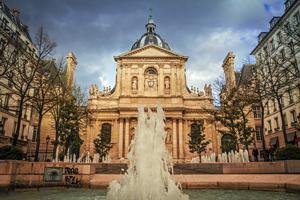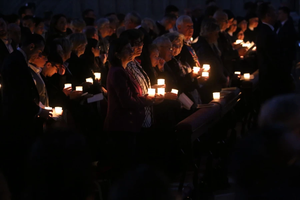‘My Bold Missionary Approach Led Me to Take Risks,’ Says Bishop Rey After His Resignation
The former emblematic bishop of the Diocese of Fréjus-Toulon in France discusses the deeper reasons for his recent departure and reflects on the future of the Catholic Church.

Bishop Dominique Rey was known throughout France and beyond for making his diocese a laboratory for the renewal of faith. For 25 years, Bishop Rey led the Diocese of Fréjus-Toulon in southern France, welcoming both traditionalist and charismatic communities, thus leading a see that became a hub for new vocations.
In January, his unexpected resignation at the age of 72 — three years before the usual age limit for diocesan bishops — raised questions about the underlying reasons for his decision.
Bishop Rey’s departure, however, did not come out of nowhere. In June 2022, Pope Francis had already prohibited him from ordaining new priests in the diocese, a highly unusual measure. An apostolic visitation followed, leading to the appointment of Bishop François Touvet as a coadjutor in November 2023. This effectively placed Bishop Rey under guardianship, with Bishop Touvet sharing diocesan governance. Officially, the emblematic bishop could have remained in office until his 75th birthday, in 2027, but his position had become increasingly untenable.
‘Surprising’ Turnaround
Speaking with the Register March 21, Bishop Rey described the context of his resignation as surprising. Indeed, he recalled that during the apostolic visit, Pope Francis initially encouraged him to stay. “The Pope told me not to resign, that I was needed,” he said. A few months later, however, he was notified that the Vatican had changed its mind. “The Pope makes the decisions,” he said, “but it is clear that he relied on the reflections and recommendations of those who had handled the matter.”
Despite the difficult circumstances, Bishop Rey said he accepted the decision out of fidelity to the Church. “Every crisis is an opportunity to return to the essentials,” he reflected. “When faced with difficulties, you can fall into discouragement or rebellion, but I chose to remain faithful to the Holy Father.”
The Holy See, for its part, has provided no further details as to why the Pope requested the prelate’s departure. A press release issued Jan. 7 refers only to the acceptance of the prelate’s resignation.
But the circumstances surrounding his withdrawal reveal deeper tensions within the Church hierarchy. The main accusations against the bishop during the apostolic visitation concerned alleged financial mismanagement and insufficient discernment in approving some ordinations. But while he conceded the existence of financial difficulties under his leadership, he kept their importance in perspective.
“Some decisions may have been questionable,” he said, “but, overall, the diocese’s financial situation is comparable to that of many other dioceses in France.” Similarly, he recalled that issues around priestly formation and ordinations were not unprecedented in the country.
Nonetheless, these points gave the Vatican a formal framework for intervening. According to Le Figaro’s Jean-Marie Guénois, Pope Francis’ discomfort with the traditionalist influence may also have been a decisive factor in Bishop Rey’s departure.
The Vatican expert claimed that the Holy Father has sought to limit the influence of traditionalist groups and to exercise greater control over “new communities” — often charismatic movements that operate independently from diocesan structures. Bishop Rey’s approach of widely welcoming both streams may have been seen as too risky.
“I did take risks sometimes, with a bold missionary approach,” he commented. “But as I often say, if you leave the car in the garage, you’ll never have an accident. Jesus himself took risks. And this boldness has also borne fruit: vocations, a strong pastoral presence, and a solid network of parishes and communities.”
Bishop Rey added that in a context of rampant de-Christianization, the contribution of these communities often reactivated pastoral dynamics.
Early in his episcopate, he traveled widely to study different models of missionary dynamism. He visited Latin America, Africa and the United States, where he observed how the Church was thriving in diverse cultural and social contexts.
“I’ve always prioritized mission,” he explained. “My personal and vocational commitment has been centered on evangelization and the desire to make the Church a missionary community in a secularized society, where the cultural matrix of Christianity is rapidly eroding.”
A Path for Traditionalist Communities
Drawing on his years of experience, the French prelate believes that the Church’s relationship with communities attached to the traditional Latin Mass should be based on both pastoral sensitivity and clear guidelines. He insists that the Church must listen to young people drawn to the traditional form of the liturgy.
“Many of them do not come from the traditionalist world but are converts, catechumens, people searching for spiritual roots,” he explained, adding that many of them could just as easily go on pilgrimage to Paray-le-Monial (from the charismatic Emmanuel Community) as to Chartres (with its traditionalist sensibility). “The Holy Spirit also acts through Christian peoples and through the need today for sacredness and rituality in a secularized world, the need to rediscover our roots.”
He emphasized that the Church needs to engage with this phenomenon more carefully and avoid simplistic judgments. “The goal is not to let them become isolated and closed off, exposed to the risk of extremism,” he warned.
At the same time, Bishop Rey believes that synodality — a key priority for Pope Francis — should apply to these communities as well.
“Synodality means to discern, accompany and integrate these sensibilities into the ecclesial fabric,” he explained. “Some may refuse, and they would have to take their own responsibility for that. But we must remain attentive because the future of the Church also depends on this diversity.”
Keys to Overcoming Church’s Crisis
Asked about the main directions the Church should take in the coming years to address its current internal crisis, Bishop Rey identified four major challenges for Western societies, on the basis of his experience. First, the importance of maintaining continuity, pointing to the Church’s 2,000-year history as a source of stability in an unstable world.
He then called for greater communion in a fragmented society marked by individualism and division. “Christianity’s contribution is to offer a sense of universal communion that transcends particular or national interests, the loss of the collective. To be able to talk about fraternity, you need to have a fatherhood.”
The third posture to adopt is, in his view, to “nurture what is growing.” It is “an attitude of accompaniment, of resilience, of attention to each individual.”
Finally, he recommended remaining open to the action of the Holy Spirit, especially in unexpected initiatives. “Personally, I’ve always been very sensitive to things that emerge out of the ordinary, that move us. This posture, which expresses the Church’s prophetism, seems fundamental to me.”
At age 72, Bishop Rey said he still has much to offer. He no longer holds territorial responsibilities, but he intends to continue supporting the missionary and pastoral initiatives he launched.
“Everything I’ve been able to initiate, whether think tanks, humanitarian or missionary projects, will continue to require various forms of support,” he said.
While his resignation marks the end of an era for the Diocese of Fréjus-Toulon, it’s unlikely to be the end of his work for the Catholic Church. Bishop Rey remains convinced that, at a historical crossroads, the Church’s future lies in embracing liturgical diversity while encouraging missionary boldness.
“Christianity is not simply a legacy but a promise,” he concluded. “Christianity is right in front of us.”
- Keywords:
- french bishops
- missionary bishop
















